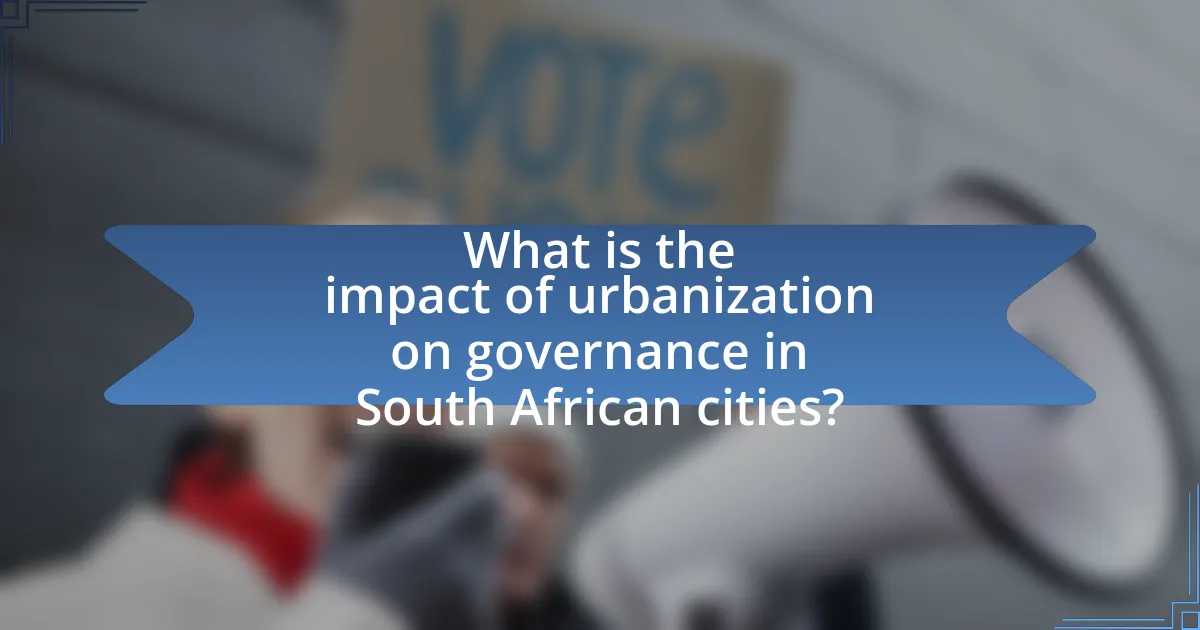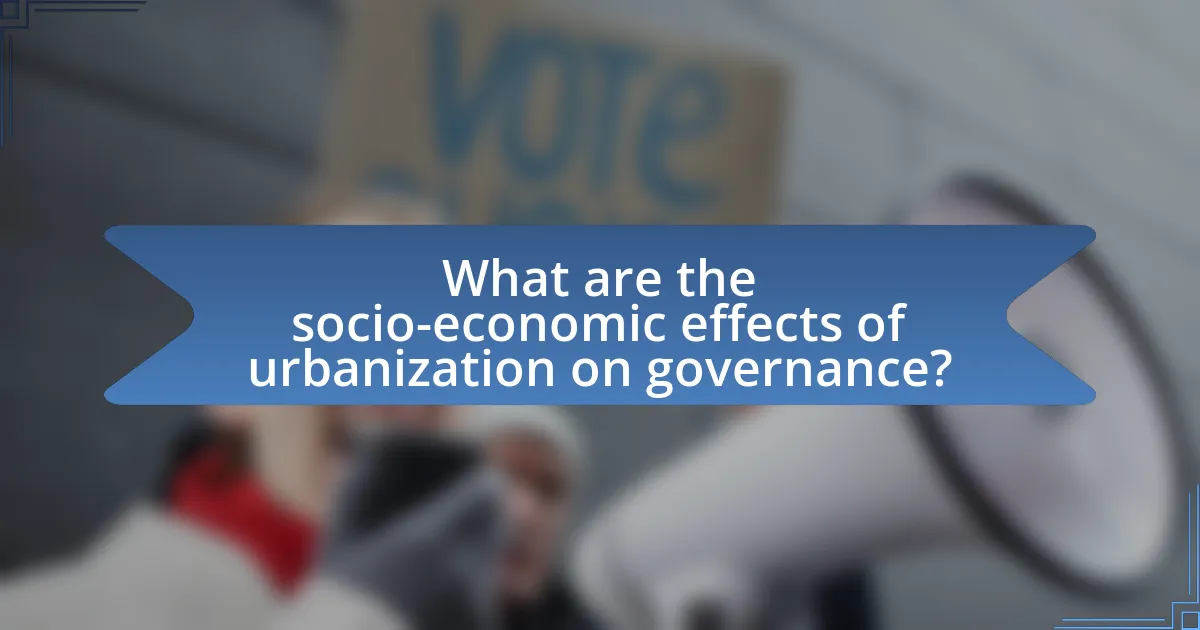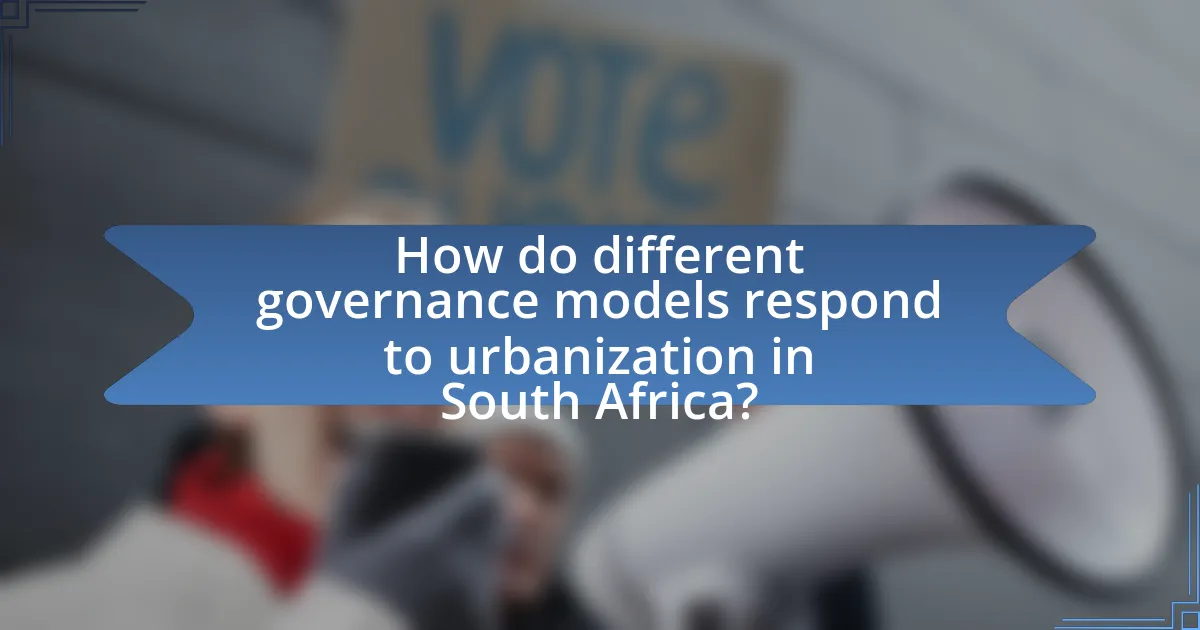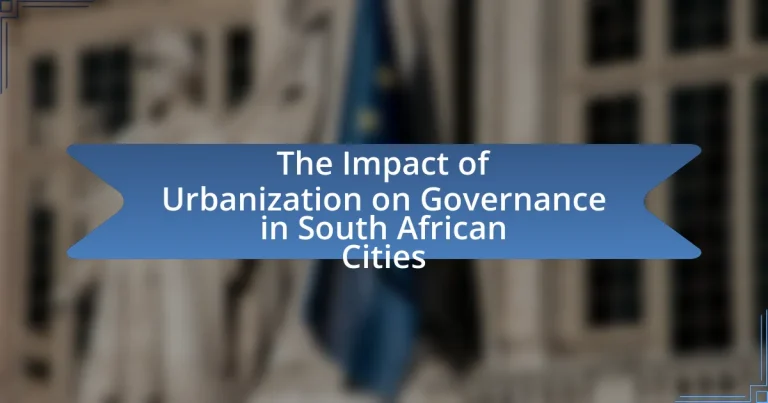The article examines the impact of urbanization on governance in South African cities, highlighting the challenges local governments face as urban populations grow. It discusses how increased demand for public services, infrastructure, and housing complicates governance, particularly in cities like Johannesburg and Cape Town. Key issues include inadequate service delivery, social inequality, and the need for adaptive governance structures. The article also explores the role of decentralized governance, public-private partnerships, and community engagement in addressing urban challenges, emphasizing the importance of effective governance for sustainable urban development.

What is the impact of urbanization on governance in South African cities?
Urbanization significantly impacts governance in South African cities by increasing the demand for efficient public services and infrastructure. As urban populations grow, local governments face challenges in managing resources, providing housing, and ensuring access to essential services like water, sanitation, and transportation. For instance, the rapid urbanization in cities like Johannesburg and Cape Town has led to increased informal settlements, which complicate governance due to the lack of formal land tenure and service delivery. According to the South African Cities Network, urban areas are expected to house 71% of the population by 2030, intensifying the pressure on governance structures to adapt and respond effectively to these changes.
How does urbanization influence governance structures in these cities?
Urbanization significantly influences governance structures in South African cities by necessitating adaptive policies and frameworks to manage increased population density and urban challenges. As cities expand, local governments face heightened demands for infrastructure, housing, and public services, leading to the decentralization of governance to enhance responsiveness and efficiency. For instance, the rapid urban growth in cities like Johannesburg and Cape Town has prompted the establishment of specialized agencies focused on urban planning and service delivery, reflecting a shift towards more collaborative governance models. This evolution is supported by data indicating that urban areas in South Africa are projected to house over 70% of the population by 2030, underscoring the urgency for effective governance adaptations to address urbanization’s complexities.
What are the key governance challenges arising from rapid urbanization?
The key governance challenges arising from rapid urbanization include inadequate infrastructure, increased demand for public services, and social inequality. In South African cities, rapid urbanization has led to significant strain on existing infrastructure, resulting in traffic congestion, insufficient housing, and limited access to clean water and sanitation. The demand for public services, such as healthcare and education, has surged, often outpacing the government’s ability to provide these essential services effectively. Furthermore, social inequality has been exacerbated, as marginalized communities face barriers to accessing resources and opportunities, leading to increased tensions and potential unrest. These challenges necessitate innovative governance strategies to ensure sustainable urban development and equitable resource distribution.
How do local governments adapt to the pressures of urbanization?
Local governments adapt to the pressures of urbanization by implementing strategic urban planning, enhancing infrastructure, and promoting sustainable development practices. For instance, in South African cities, local governments have adopted integrated development plans that prioritize housing, transportation, and public services to accommodate growing populations. Additionally, they invest in upgrading existing infrastructure, such as roads and public transport systems, to improve accessibility and reduce congestion. Evidence of this adaptation can be seen in the City of Cape Town’s initiatives to develop affordable housing and improve public transport networks, which aim to address the challenges posed by rapid urban growth.
Why is understanding this impact crucial for urban planning?
Understanding the impact of urbanization on governance is crucial for urban planning because it directly influences resource allocation, infrastructure development, and policy formulation. Urbanization in South African cities has led to increased population density, which necessitates effective governance to manage public services and ensure sustainable development. For instance, the rapid growth of informal settlements requires planners to address housing, sanitation, and transportation challenges effectively. Research indicates that cities experiencing high urbanization rates often face governance issues, such as inadequate service delivery and increased social inequality, which can hinder overall urban development. Therefore, comprehending these impacts allows urban planners to create strategies that promote equitable growth and enhance the quality of life for residents.
What role does governance play in sustainable urban development?
Governance plays a critical role in sustainable urban development by establishing frameworks that guide decision-making, resource allocation, and community engagement. Effective governance ensures that urban planning incorporates environmental, social, and economic considerations, promoting resilience and inclusivity. For instance, the South African National Development Plan emphasizes the importance of good governance in achieving sustainable urban growth, highlighting that transparent policies and stakeholder participation lead to better urban outcomes. Furthermore, research indicates that cities with strong governance structures are more successful in implementing sustainable practices, as seen in the case of Cape Town’s Integrated Development Plans, which align urban development with sustainability goals.
How can effective governance mitigate the negative effects of urbanization?
Effective governance can mitigate the negative effects of urbanization by implementing comprehensive urban planning and regulatory frameworks. These frameworks can address issues such as housing shortages, infrastructure strain, and environmental degradation. For instance, cities like Cape Town have adopted integrated development plans that prioritize sustainable land use and resource management, which helps to alleviate overcrowding and improve living conditions. Additionally, effective governance fosters community engagement and participatory decision-making, ensuring that urban policies reflect the needs of diverse populations. Research indicates that cities with strong governance structures experience lower rates of urban poverty and better service delivery, as seen in Johannesburg’s initiatives to enhance public transport and sanitation services.

What are the socio-economic effects of urbanization on governance?
Urbanization significantly affects governance by altering socio-economic dynamics, leading to increased demand for public services and infrastructure. As cities grow, local governments face challenges in managing resources, which can result in inadequate service delivery and increased inequality. For instance, in South Africa, rapid urbanization has led to a surge in informal settlements, straining municipal budgets and complicating urban planning efforts. According to the South African Cities Network, urban areas are expected to house 71% of the population by 2030, intensifying the pressure on governance structures to adapt and respond effectively to these changes. This situation often results in governance issues such as corruption, inefficiency, and social unrest, as marginalized communities demand better access to services and representation.
How does urbanization affect service delivery in South African cities?
Urbanization significantly strains service delivery in South African cities by increasing demand for essential services such as water, sanitation, and housing. Rapid population growth in urban areas leads to overcrowding, which exacerbates existing infrastructure challenges. For instance, the South African Cities Network reported that cities like Johannesburg and Cape Town face severe water shortages due to high urban migration rates, with demand outpacing supply. Additionally, the lack of adequate planning and investment in infrastructure further complicates service delivery, resulting in unequal access to services among different communities. This situation highlights the urgent need for improved governance and strategic planning to address the challenges posed by urbanization in South Africa.
What are the implications for public health and education services?
Urbanization in South African cities significantly impacts public health and education services by straining existing infrastructure and resources. Increased population density leads to higher demand for healthcare facilities and educational institutions, often resulting in overcrowding and reduced quality of services. For instance, the World Health Organization reports that urban areas face challenges such as increased rates of communicable diseases due to inadequate sanitation and healthcare access. Additionally, the South African Department of Basic Education highlights that urbanization can exacerbate educational disparities, as schools in densely populated areas may struggle to accommodate the influx of students, leading to larger class sizes and diminished educational outcomes. These implications necessitate targeted policy interventions to enhance service delivery in both sectors.
How does urbanization impact housing and infrastructure development?
Urbanization significantly accelerates housing and infrastructure development by increasing demand for residential spaces and essential services. As populations migrate to urban areas, the need for housing rises sharply, leading to rapid construction and expansion of residential units. For instance, in South Africa, urban areas have seen a growth rate of approximately 2.5% annually, necessitating the development of over 1.5 million housing units by 2030 to accommodate this influx.
Additionally, urbanization drives improvements in infrastructure, such as transportation, water supply, and sanitation systems, to support the growing population. The South African government has invested heavily in infrastructure projects, with the National Development Plan highlighting the need for enhanced public transport and utilities to meet urban demands. This investment is crucial for sustainable urban growth and improving living conditions in cities.
What are the political ramifications of urbanization on governance?
Urbanization significantly alters governance structures by increasing the complexity of urban management and necessitating more responsive political frameworks. As cities grow, local governments face heightened demands for services, infrastructure, and social equity, which can lead to political instability if not addressed effectively. For instance, in South Africa, rapid urbanization has resulted in increased informal settlements, prompting local authorities to adapt policies to manage housing, sanitation, and public safety. This shift often requires collaboration between various levels of government and stakeholders, highlighting the need for decentralized governance models. Additionally, urbanization can amplify social inequalities, leading to political tensions and demands for greater representation and accountability from marginalized communities.
How does urbanization influence voter behavior and political participation?
Urbanization significantly influences voter behavior and political participation by increasing access to information and facilitating social interactions among diverse populations. In urban areas, residents are more likely to engage in political discussions and mobilize for collective action due to proximity to political institutions and events. For instance, a study by the Electoral Commission of South Africa found that urban voters are more likely to participate in elections compared to their rural counterparts, with urban areas showing a turnout rate of approximately 75% in recent elections, compared to around 55% in rural regions. This trend is attributed to better access to resources, education, and civic engagement opportunities in urban settings, which collectively enhance political awareness and participation.
What challenges do urban areas face in terms of political representation?
Urban areas face significant challenges in political representation, primarily due to population density and diversity, which complicate the representation of various interests. The rapid urbanization in South African cities has led to a situation where traditional political structures often fail to adequately represent the needs of marginalized communities. For instance, the South African Local Government Association reported that many urban residents feel disconnected from local governance, leading to low voter turnout and engagement. Additionally, the fragmentation of political parties and the prevalence of informal settlements further exacerbate the issue, as these areas often lack formal representation in decision-making processes. This disconnect can result in policies that do not reflect the realities of urban populations, highlighting the urgent need for reforms in political representation to ensure inclusivity and responsiveness in governance.

How do different governance models respond to urbanization in South Africa?
Different governance models in South Africa respond to urbanization through varying strategies that address infrastructure, service delivery, and community engagement. For instance, decentralized governance models empower local municipalities to tailor responses to urban challenges, such as housing shortages and transportation issues, by allowing them to allocate resources based on specific local needs. In contrast, centralized governance often leads to uniform policies that may not effectively address the unique circumstances of diverse urban areas, resulting in inefficiencies in service delivery.
Evidence of these differences can be seen in the implementation of the Integrated Urban Development Framework (IUDF), which promotes collaborative governance among national, provincial, and local levels to better manage urban growth. This framework aims to enhance urban resilience and sustainability, reflecting the necessity for adaptive governance in the face of rapid urbanization. Additionally, studies indicate that cities with strong local governance structures, such as Cape Town, have been more successful in managing urbanization challenges compared to those with weaker governance frameworks.
What are the strengths and weaknesses of decentralized governance in urban areas?
Decentralized governance in urban areas has strengths such as increased local participation and tailored decision-making, while its weaknesses include potential fragmentation and resource disparities. Local participation enhances community engagement, allowing residents to influence policies that directly affect them, which can lead to more relevant and effective governance. For instance, studies show that cities with decentralized governance structures often report higher citizen satisfaction and involvement in local affairs. However, the fragmentation of authority can lead to inconsistencies in policy implementation and service delivery, as different local entities may prioritize divergent goals. Additionally, resource disparities can arise, where wealthier areas attract more investment and attention, leaving poorer regions underserved, as evidenced by various urban studies highlighting inequities in service provision across different neighborhoods.
How does decentralization affect local decision-making and accountability?
Decentralization enhances local decision-making and accountability by transferring authority and resources from central governments to local entities. This shift allows local governments to tailor policies and services to the specific needs of their communities, leading to more relevant and effective governance. For instance, a study by the World Bank in 2019 highlighted that decentralized governance in South Africa improved service delivery in municipalities, as local leaders were more attuned to the unique challenges faced by their constituents. Furthermore, decentralization fosters greater accountability, as local officials are directly answerable to their communities, which can lead to increased public participation and scrutiny. This dynamic was evidenced in the 2016 local elections in South Africa, where increased voter engagement was linked to the decentralization of powers, demonstrating a direct correlation between local governance structures and citizen accountability.
What examples exist of successful decentralized governance in South African cities?
Successful decentralized governance examples in South African cities include the City of Cape Town’s Integrated Development Planning (IDP) process and the eThekwini Municipality’s participatory budgeting initiatives. The IDP process in Cape Town allows for community input in urban planning, ensuring that local needs are prioritized in decision-making. In eThekwini, participatory budgeting has empowered residents to influence budget allocations directly, enhancing transparency and accountability. These initiatives demonstrate effective local governance that responds to the unique challenges posed by urbanization in South Africa.
How do public-private partnerships play a role in urban governance?
Public-private partnerships (PPPs) significantly enhance urban governance by facilitating collaboration between government entities and private sector organizations to deliver public services and infrastructure. These partnerships leverage private investment, expertise, and efficiency to address urban challenges such as housing, transportation, and waste management. For instance, in South Africa, the Gautrain project exemplifies a successful PPP that improved public transport infrastructure, reducing congestion and promoting economic growth. This collaboration not only accelerates project delivery but also fosters innovation and accountability, ultimately leading to more sustainable urban development.
What are the benefits of collaboration between government and private sectors?
Collaboration between government and private sectors enhances resource efficiency and innovation in urban governance. This partnership allows for the pooling of financial, human, and technological resources, leading to improved public services and infrastructure development. For instance, the South African government has engaged in public-private partnerships (PPPs) to address urban challenges, such as housing and transportation, resulting in projects like the Gautrain rapid rail system, which has improved connectivity in Gauteng. Additionally, collaboration fosters knowledge sharing and best practices, enabling governments to leverage private sector expertise in areas like urban planning and sustainability. This synergy ultimately leads to more effective governance and better outcomes for urban populations.
How can these partnerships address urban challenges effectively?
Partnerships can address urban challenges effectively by leveraging combined resources, expertise, and innovative solutions to tackle issues such as housing, transportation, and infrastructure. For instance, collaborative efforts between government entities, private sectors, and community organizations can lead to the development of sustainable urban policies that enhance service delivery. Evidence from the South African context shows that partnerships have successfully implemented projects like the Integrated Urban Development Framework, which aims to improve urban planning and governance, thereby addressing challenges such as informal settlements and inadequate public transport. These collaborative approaches not only pool financial resources but also foster community engagement, ensuring that solutions are tailored to the specific needs of urban populations.
What best practices can enhance governance in urbanized South African cities?
Best practices that can enhance governance in urbanized South African cities include promoting participatory governance, implementing effective data management systems, and fostering intergovernmental collaboration. Participatory governance allows citizens to engage in decision-making processes, which has been shown to improve accountability and transparency in local government. For instance, the City of Cape Town has successfully utilized public consultations to inform urban planning initiatives, leading to more community-aligned outcomes.
Effective data management systems enable cities to collect, analyze, and utilize data for informed decision-making. The use of Geographic Information Systems (GIS) in Johannesburg has improved urban planning and service delivery by providing accurate spatial data for resource allocation.
Fostering intergovernmental collaboration ensures that different levels of government work together to address urban challenges. The South African government has established frameworks for collaboration between national, provincial, and local governments, which has led to more coordinated responses to urbanization issues, such as housing and infrastructure development. These practices collectively contribute to more effective governance in urbanized South African cities.
How can technology improve governance and service delivery in urban areas?
Technology can improve governance and service delivery in urban areas by enhancing data collection, communication, and efficiency in public services. For instance, smart city technologies, such as IoT sensors, enable real-time monitoring of infrastructure, which helps local governments respond quickly to issues like traffic congestion or waste management. According to a report by the McKinsey Global Institute, cities that adopt digital technologies can increase their productivity by up to 30%, leading to better resource allocation and improved public services. Additionally, e-governance platforms facilitate transparent communication between citizens and government, fostering accountability and citizen engagement. This integration of technology not only streamlines operations but also empowers residents, ultimately leading to more effective governance and service delivery in urban environments.
What strategies can be implemented to foster community engagement in governance?
To foster community engagement in governance, strategies such as participatory budgeting, community forums, and digital platforms can be implemented. Participatory budgeting allows residents to have a direct say in how public funds are allocated, enhancing transparency and accountability. Community forums provide a space for dialogue between citizens and local officials, encouraging feedback and collaboration on governance issues. Digital platforms, including social media and dedicated apps, facilitate real-time communication and information sharing, making it easier for citizens to engage with governance processes. These strategies have been shown to increase civic participation and improve the responsiveness of local governments, as evidenced by successful initiatives in various South African cities where community involvement has led to more effective governance outcomes.


